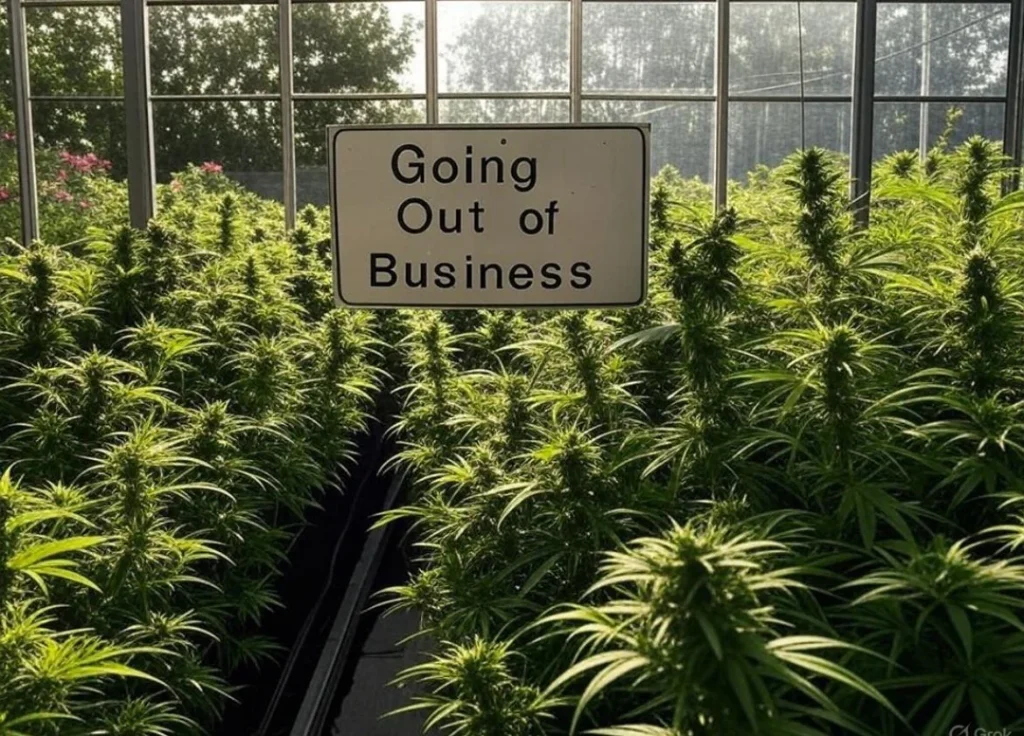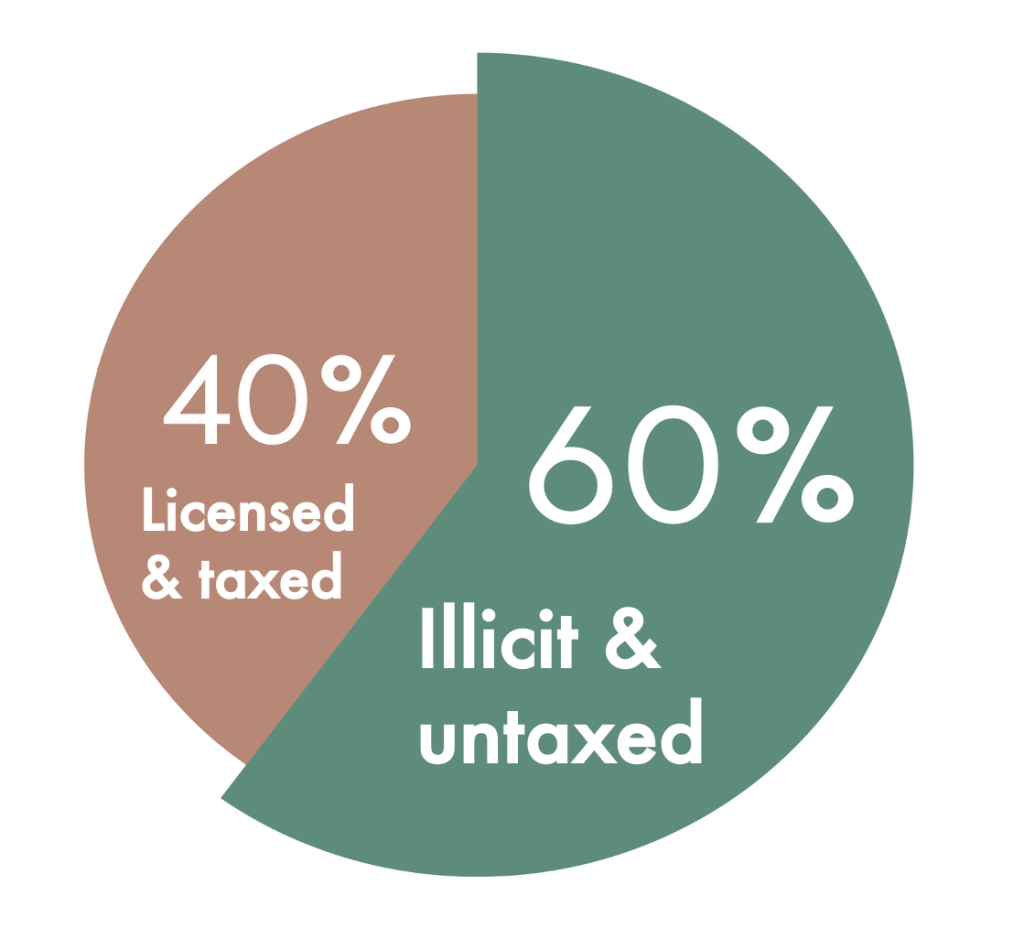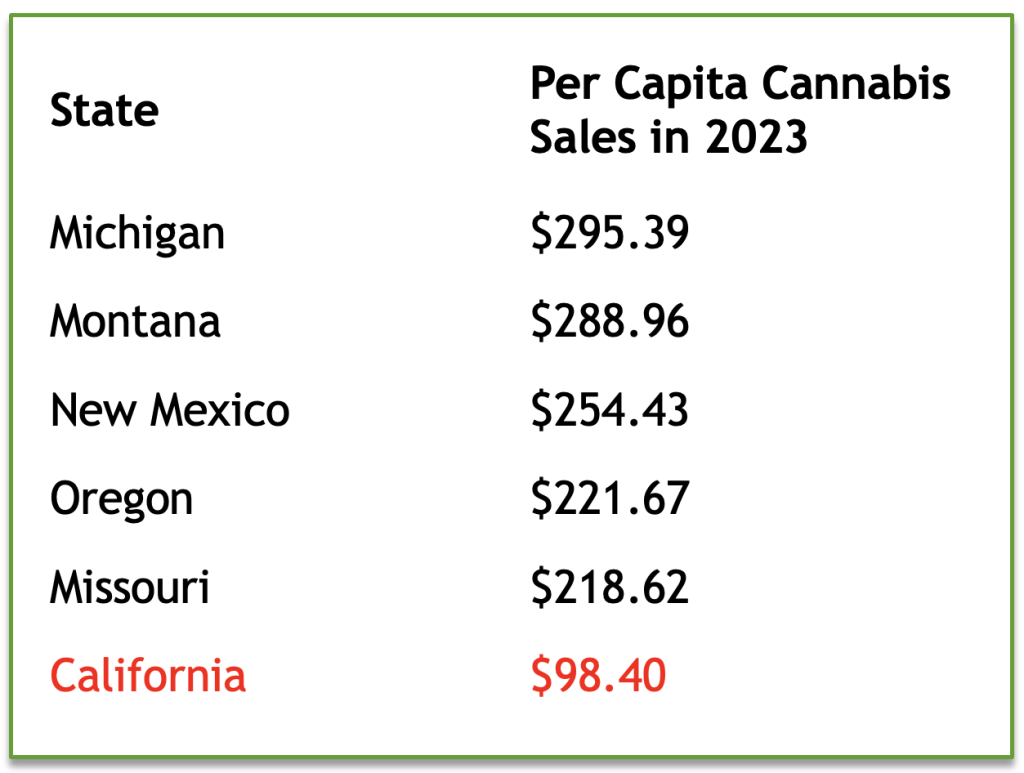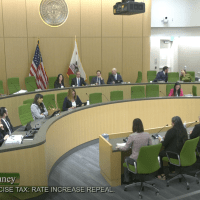WRITE TO YOUR LEGISLATOR AND ASK THEM TO SUPPORT AB 564
AB 564 (Haney), a bill that would freeze California’s state excise tax on cannabis at 15%, rather than seeing it raise to 19% on July 1, 2025, will next be heard on Monday, May 5 at 2:30 PM in the Assembly Revenue and Taxation committee. Come and show your support!

California’s cannabis market has lost 30% of its active licenses in the past two years
Inactive cannabis licenses are climbing as California companies struggle to stay in business. Inactive licensees don’t make money, or pay taxes. Many of the inactive licenses are equity businesses, who are already facing a de facto tax increase as the vendor compensation program for cannabis equity businesses is set to expire on 12/31/25.
California’s licensed retail footprint has flatlined at roughly 1,225 active stores since mid-2023, as 57% of the state’s cities and counties still prohibit cannabis dispensaries, according to the California Department of Cannabis Control (DCC).
 6 out of every 10 cannabis sales in CA is from the illicit, untaxed market
6 out of every 10 cannabis sales in CA is from the illicit, untaxed market
A new report from the CA Department of Cannabis Control estimates that total California cannabis consumption is 3.8 million pounds, and that only 1.4 million pounds is sold from the licensed market. This means the majority of cannabis sold in California is untaxed. High tax rates in the licensed market are a big reason consumers look elsewhere for their cannabis.
California lost 17,600 cannabis jobs in the last two years
California led the nation with 12,600 cannabis jobs lost in 2023 and 5,000 cannabis jobs lost in 2024, according to industry employment agency Vangst.

Other states with lower taxes outperform CA’s cannabis sales
Michigan, with its 10% state excise tax that is shared with local jurisdictions (which have no taxes of their own), is pointed to as a model for a successful roll-out of marijuana legalization. Missouri has a 6% state excise tax and caps local taxes at 3% (California has no such cap).
If California were on par in per capita sales with Michigan or Montana, it would be generating an estimated $13 billion in annual sales, and the state would be collecting substantially more tax revenue. Instead, the taxable sales for cannabis in 2024 was $4.6 billion. Source
WRITE TO YOUR LEGISLATOR AND ASK THEM TO SUPPORT AB 564
The Cannabis Tax Account Has a Budget Surplus
In fiscal year 2023-2024, the Cannabis Tax Account had a balance of $469.6 million and took in $629.4 million in taxes, according to the DCC’s Condition and Health of the Cannabis Industry in California supplemental report. But it spent only $560.5 million because legislators contributed $150 million from the general fund. For this fiscal year, estimated revenue is $603.7 million and expenditures are nearly $674.0 million, leaving a balance of $468.2 million.
For fiscal year 2025-26, the governor’s budget projects that cannabis tax revenues will be about $761.9 million, assuming the excise tax will increase to 19% on July 1. Expenditures are budgeted at only $610.2 million.
Who is Opposing a Cannabis Tax Freeze?
AB 564 is being opposed by groups that receive cannabis tax money for Youth Education Treatment and Prevention Programs, which have not been evaluated for their effectiveness, despite legislation requiring accountability.
In 2022, Governor Newsom signed AB 2925 (Cooper), requiring DHCS to provide to the Legislature by July 10, 2023 a spending report of funds from the Youth Education Prevention, Early Intervention and Treatment Account (YEPEITA) paid for by the Cannabis Tax Fund for the FY 2021–22 and 2022–23. In addition, the 2022 Budget Act stated that by March 1, 2023, and on the same date until 2025, the DOF shall submit a report to the Legislative Analyst’s Office, relevant policy committees, and the relevant budget committees of each house of the Legislature on Cannabis Tax Fund Spending.
Both AB 2925 and the 2022 Budget Act called for evaluations of YEPEITA programs, with AB 2925 stating: “The departments shall periodically evaluate the programs they are funding to determine the effectiveness of the programs.” Although DOF has provided some data in Budget Committee hearings about YEPEITA program expenditures, that data is incomplete, and no evaluations of the programs have been provided by DHCS.
We expect these groups to oppose AB 564 before the Assembly Revenue and Taxation committee hearing on Monday, May 5 at 2:30 PM. Cal NORML encourages all, particularly constituents of committee members, to continue to contact their Assemblymembers,



